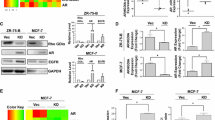Abstract
Whilst estrogen receptor (ER)-positive breast cancers are preferentially treated with hormone therapy, approximately one-third of them relapse. The mechanisms of refractoriness have been investigated by numerous studies but have not been fully clarified. Hormonal therapy resistance, particularly aromatase inhibitor (AI) resistance, may be related to the acquisition of alternative intracellular ER signaling. We have been investing the mechanisms using cancer specimens and cell lines by monitoring the transcription activity of ERs. AI refractory specimens showed diverse ER activity in the adenovirus estrogen receptor element-green fluorescent protein (ERE-GFP) assay and varied sensitivity to anti-estrogens, indicating the existence of multiple resistant mechanisms. We established six different types of cell lines mimicking AI resistance from ERE-GFP-introduced ER-positive cell lines. They revealed that multiple and alternative ER activating pathways were involved in the resistance, such as phosphorylation-dependent or androgen metabolite-dependent mechanisms. The response to fulvestrant and mammalian target of rapamycin inhibitor also varied among individual resistant cell lines. These results indicate that further subclassification of ER-positive breast cancer is extremely important to decide the therapeutic management of not only hormonal therapy but also new molecular target therapy.




Similar content being viewed by others
References
Strasser-Weippl K, Goss PE (2005) Advances in adjuvant hormonal therapy for postmenopausal women. J Clin Oncol 23(8):1751–1759
Riggins RB, Schrecengost RS, Guerrero MS et al (2007) Pathways to tamoxifen resistance. Cancer Lett 256(1):1–24
Baum M, Buzdar A, Cuzick J et al (2003) Anastrozole alone or in combination with tamoxifen versus tamoxifen alone for adjuvant treatment of postmenopausal women with early-stage breast cancer: results of the ATAC (Arimidex, Tamoxifen Alone or in Combination) trial efficacy and safety update analyses. Cancer 98(9):1802–1810
Yue W, Wang JP, Conaway MR et al (2003) Adaptive hypersensitivity following long-term estrogen deprivation: involvement of multiple signal pathways. J Steroid Biochem Mol Biol 86(3–5):265–274
Sabnis GJ, Jelovac D, Long B et al (2005) The role of growth factor receptor pathways in human breast cancer cells adapted to long-term estrogen deprivation. Cancer Res 65(9):3903–3910
Martin LA, Farmer I, Johnston SR et al (2005) Elevated ERK1/ERK2/estrogen receptor cross-talk enhances estrogen-mediated signaling during long-term estrogen deprivation. Endocr Relat Cancer 12(Suppl 1):S75–S84
Santen RJ, Song RX, Masamura S et al (2008) Adaptation to estradiol deprivation causes up-regulation of growth factor pathways and hyper sensitivity to estradiol in breast cancer cells. Adv Exp Med Biol 630:19–34
Gohno T, Seino Y, Hanamura T et al (2012) Individual transcriptional activity of estrogen receptors in primary breast cancer and its clinical significance. Cancer Med 1(3):328–337
Yamaguchi Y, Takei H, Suemasu K et al (2005) Tumor-stromal interaction through the estrogen-signaling pathway in human breast cancer. Cancer Res 65(11):4653–4662
Matsumoto M, Yamaguchi Y, Seino Y et al (2008) Estrogen signaling ability in human endometrial cancer through the cancer-stromal interaction. Endocr Relat Cancer 15(2):451–463
Hanamura T, Niwa T, Nishikawa S et al (2013) Androgen metabolite-dependent growth of hormone receptor-positive breast cancer as a possible aromatase inhibitor-resistance mechanism. Breast Cancer Res Treat 139(3):731–740
Hanamura T, Niwa T, Gohno T et al (2014) Possible role of the aromatase-independent steroid metabolism pathways in hormone responsive primary breast cancers. Breast Cancer Res Treat 143(1):69–80
Fujiki N, Konnno H, Kaneko Y et al (2014) Estrogen response element-GFP (ERE-GFP) introduced MCF-7 cells demonstrated the coexistence of multiple estrogen-deprivation resistant mechanisms. J Steroid Biochem Mol Biol 139:61–72
Cambell RA, Bhat-Nakshatri P, Patel NM et al (2001) Phosphatidylinositol 3-kinase/AKT-mediated activation of estrogen receptor alpha: a new model for anti-estrogen resistance. J Biol Chem 276(13):9817–9824
Castano E, Vorojeikina DP, Notides AC (1997) Phosphorylation of serine-167 on the human oestrogen receptor is important for oestrogen response element binding and transcriptional activation. Biochem J 326(Pt1):149–157
Yamashita H, Nishio M, Kobayashi S et al (2005) Phosphorylation of estrogen receptor alpha serine 167 is predictive of response to endocrine therapy and increases postrelapse survival in metastatic breast cacer. Breast Cancer Res 7(5):R753–R764
Fujii R, Hanamura T, Suzuki T et al (2014) Increased androgen receptor activity and cell proliferation in aromatase inhibitor-resistant breast carcinoma. J Steroid Biochem Mol Biol 144 Pt B:513–522
Miller TW (2013) Endocrine resistance: what do we know? Am Soc Clin Oncol Educ Book. doi:10.1200/EdBook_AM.2013.33.e37
Di Leo A, Jerusalem G, Petruzelka L et al (2014) Final overall survival: fulvestrant 500 mg vs 250 mg in the randomized CONFIRM trial. J Natl Cancer Inst 106:djt337
Zardavas D, Phillips WA, Loi S (2014) PIK3CA mutations in breast cancer: reconciling findings from preclinical and clinical data. Breast Cancer Res 16:201
Baselga J, Campone M, Piccart M et al (2012) Everolimus in postmenopausal hormone-receptor-positive advanced breast cancer. N Engl J Med 366:520–529
Piccart M, Hortobagyi GN, Campone M et al (2014) Everolimus plus exemestane for hormone-receptor-positive, human epidermal growth factor receptor-2-negative advanced breast caner: overall survival results from BOLERO-2. Ann Oncol 25:2357–2362
Diaby V, Adunlin G, Ali AA et al (2014) Using quality-adjusted progression-free survival as an outcome measure to assess the benefits of cancer drugs in randomized-controlled trials: case of the BOLERO-2 trial. Breast Cancer Res Treat 146:669–673
Zardavas D, Baselga J, Piccart M (2013) Emerging targeted agents in metastatic breaset cancer. Nat Rev Clin Oncol 10:191–210
Musgrove EA, Sutherland RL (2009) Biological determinants of endocrine resistance in breast cancer. Nat Rev Cancer 9(631):6–43
Cadoo KA, Gucalp A, Traina TA (2014) Palbociclib: an evidence-based review of its potential in the treatment of breast cancer. Breast Cancer (Dove Med Press) 6:123–133
Johnston SR, Schiavon G (2013) Treatment algorithms for hormone receptor-positive advanced breast cancer: going forward in endocrine therapy—overcoming resistance and introducing new agents. Am Soc Clin Oncol Educ Book. doi:10.1200/EdBook_AM.2013.33.e28
Conflict of interest
The authors declare that they have no conflict of interest.
Author information
Authors and Affiliations
Corresponding author
About this article
Cite this article
Hayashi, Si., Kimura, M. Mechanisms of hormonal therapy resistance in breast cancer. Int J Clin Oncol 20, 262–267 (2015). https://doi.org/10.1007/s10147-015-0788-5
Received:
Accepted:
Published:
Issue Date:
DOI: https://doi.org/10.1007/s10147-015-0788-5




